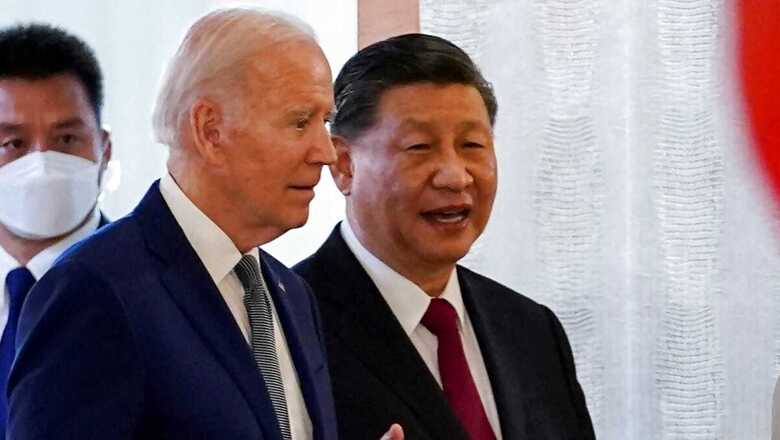
views
Xi Jinping and Joe Biden will huddle on the sidelines of the APEC summit in California for their first encounter in a year as trade tensions, sanctions and the question of Taiwan have led to quarrels between Washington and Beijing. Both leaders are expected to meet for several hours on Wednesday.
Chinese President Xi Jinping and US President Joe Biden will be holding a crucial bilateral meeting on the sidelines of the Asia-Pacific Economic Cooperation (APEC) summit in California. Both leaders are holding this important meeting as Beijing and Washington relations have taken a hit due to trade tensions, sanctions and the Taiwan question.
Both heads of state landed in San Francisco on Tuesday, a day before the meeting. Xi Jinping was greeted by California governor Gavin Newsom at San Francisco International Airport.
Biden said that the aim of the meeting is to mend the relations between both economic powers. “We’re not trying to decouple from China. What we’re trying to do is change the relationship for the better. (We want) to get back on a normal course of correspondence; being able to pick up the phone and talk to one another if there’s a crisis; being able to make sure our (militaries) still have contact with one another,” Biden said.
The Chinese response to what Beijing expects from the summit remained vague. The Chinese officials said that they expect “in-depth communication” between both leaders and “major issues concerning world peace” will be discussed.
What’s At Stake for India
Government sources, familiar with the developments, told CNN-News18 said that they do not expect a major breakthrough between the two superpowers. They said that the wars in West Asia between Israel and Hamas and the war in eastern Europe between Russia and Ukraine will be discussed. The US will press China not to support Russia, the aforementioned people said.
The US will also focus on economic cooperation, fair trade and intellectual property. US President Biden himself said the United States was wary of investing in China due to Beijing’s business practices.
“I’m not going to continue to sustain the support for positions where if we want to invest in China, we have to turn over all our trade secrets,” he said.
The people mentioned above said small steps will be taken to manage the relationship and avoid any direct clash.
The aforementioned people pointed out that Indo-Pacific will constitute a huge chunk of the discussions but there is no scope for any new agreements.
They said that Chinese President Xi Jinping will not change any of China’s geopolitical or economic policies in order to continue competing with India economically. They will continue to make false territorial claims in the region and engage in border clashes and disputes.
The aforementioned people told CNN-News18 said lack of breakthrough could turn out to be a positive for US-India bilateral relations.
China has emerged as the world’s largest debt collector, upturning several small nations’ economies who took loans to develop infrastructure under the Belt and Road Initiative (BRI). Over 150 smaller nations owe China more than $1.1 trillion in debt.
The people mentioned above highlighted that if these smaller countries disagree to clear their Chinese debts, then China can take over their infrastructure but the US may approach India and seek help on handling such a situation, if such a situation arises.
The officials, however, believe that it “is difficult to change China”. They said India can, however, work with the US and use this as an opportunity to project its global power.
They spoke of a possibility of a power shift if Washington and New Delhi make a move and decide to buy back some of the debt from those countries. In such a scenario, these nations will owe India and the US, rather than China.
“If political balance and loyalties can be shifted, it may become harder for China to penetrate those nations and use them for security purposes,” they said.
The decision to spend on domestic projects by successive US administrations may have allowed the Chinese government to spread its economic influence over scores of low-income countries, the officials believe.
Bangladesh
China is keeping a close eye on developments coming out of Bangladesh as Sheikh Hasina faces a crucial election while the nation navigates through economic and political challenges.
“Bangladesh is next door to India. For China, Bangladesh presents an opportunity as the US is not backing Dhaka,” the aforementioned people observed.
The US on several occasions this year has urged Bangladesh to protect press freedom and not take actions that undermine the democratic system of the country.




















Comments
0 comment